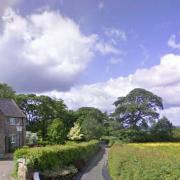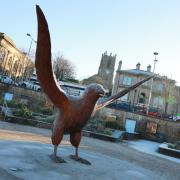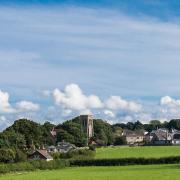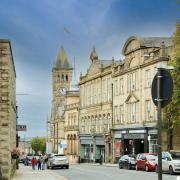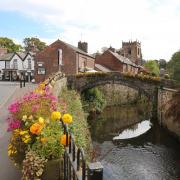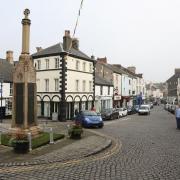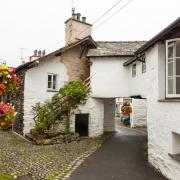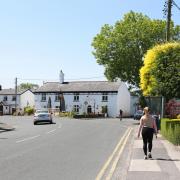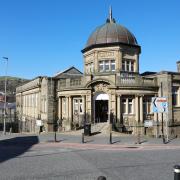Today, we know Ribby Hall as a five star holiday and leisure venue near Preston. But House historians Carole Knight and Jude O’Gorman have been digging deeper into its past

When we researched the history of Ribby Hall in Wrea Green we uncovered much information about the Hornby family, well established members of the Kirkham merchant class and the first occupiers and owners of the Hall. However, the research also shed light onto the life of a later, and possibly less well known owner, William Duckworth.
William was a man from humble beginnings whose commercial acumen led to his establishing an economically successful international company, the legacy of which continues to this day.
He was born on Christmas Day in 1861, the son of George and Betty Duckworth. He was their sixth child and they were living in a small cottage on bleak moorland near Hoddlesdon. George initially earned a living as a carter, but in 1881 the family had moved to Blackburn where he and two of his sons became butchers.
However, William was employed as a druggist’s apprentice to the firm of Ainsworth and Clayton at Northgate, Blackburn. It was around this time that his entrepreneurial ambitions came to the fore because in 1884, at the age of 23, he left to set up in partnership with a Samuel Kirtlan.

Duckworth and Kirtlan operated as manufacturing chemists and mineral water essence makers at Corporation Street, Manchester. The partnership was short-lived but William was fired with a determination to explore further this fledgling industry. The firm of Duckworth and Co. was established and it was set to make William a fortune.
In the late 19th century there was a growing demand for packaged food and bottled drinks. This in turn fuelled an expansion in the manufacture of flavourings, achieved by isolating natural substances or reproducing them by chemical synthesis. The packaging industry was also responding to a change in food retailing with the introduction of tins for preserving fruit and vegetables and, more importantly for William, the invention of the crown cap in 1892 which revolutionised the bottling of drinks. It was clear that to keep pace with this booming industry some investment was needed, and William was not one to do thing by halves. In 1896, Duckworth and Co moved to a purpose built factory on Chester Road in Manchester, an impressive red brick building.
With the latest technology to hand, the company could now offer a wider range of products and, with orders flooding in from across the world, he was set to become a brand leader.
A large proportion of Duckworth’s customers were food and drink manufacturers who purchased supplies to enhance the taste and appearance of their products. One example was ‘Foamine, a splendid preparation for producing a thick, creamy, and lasting head upon all kinds of aerated waters and brewed beverages.’ The company also sold a wide range of essential oils, fruit essences and colours for confectionery.
Just about any thirst-quenching refreshment could be prepared from Duckworth’s range of concentrates - from Ginger Ale to Jubilee Champagne. Inventing beverages for a particular sector of the population became a popular marketing device in late Victorian England. In 1899, Duckworth and Co. launched ‘Clincher Squash, the Cyclists’ Own Drink’. Adverts claimed ‘it braced up the system’. The company was registered as inventors and sole manufacturers of this wonder product, which would have sold well alongside the Red Bull-type energy drinks of today.
It was not just in business that William’s life was moving forward. In 1889 he married Emily Blackburn, the daughter of Thomas Blackburn, a grocer with a shop on Duke’s Brow in Blackburn. The couple went on to have nine children although one child, a boy, died at birth. Initially they lived at Urmston, and then they moved to Flixton, followed by a short spell in Southport. At this stage of his life William was able to provide his family with a very comfortable life-style; they had four live-in servants and took regular holidays both in England and abroad.
In 1904 William took the lease of Ribby Hall from the Hornby family, well-known makers of sail cloth, and he eventually bought it and the grounds in 1916. It was during his residency that William was able to really enjoy the fruits of his commercial success by extending and refurbishing the house and gardens, both projects undertaken at considerable expense. The north and south facades of the Hall had bow windows added and a corridor was built to link the house with an orangery and greenhouses. The interior of the house was filled with choice antiques and furnishings. A journalist writing about the Hall in 1929 made reference to the intricate French tapestry which covered many of the walls and the pieces of exquisite antique furniture which filled the rooms.
Horticulture was a passion for William and in addition to the greenhouses in which he grew a variety of orchids he also loved his garden. He twice commissioned the famous firm of Mawson and Sons to redesign the gardens at the Hall. The firm was employed in 1906 and 1914 constructing tennis courts, a croquet lawn, flower beds and shrubberies. A series of outdoor rooms were laid out: the Ladies’ garden, the Rose garden and the Blue garden, all separated by ornate pierced brick walls. Sadly, they were lost forever when the site became home to Royal Lancashire Show in 1972.
William knew how to enjoy his success - he enjoyed fishing and shooting and indulged these interests by purchasing a small grouse moor near Scorton and a bigger estate in Scotland. He loved the good things in life, William’s grandson observing that ‘he never had a car until he could afford the best.’
Around 1927 he bought a Rolls Royce and a Humber. Both were liveried in green with leather seats and they were used until the 1940s. Apparently William was not an early riser and his chauffeur occasionally had to chase the train to Manchester hoping to catch it at one of the intervening stations, not always successfully.
Apart from his business life, William became a JP, a member of the Carlton Club in London and a Governor of Kirkham Grammar School.
In 1942, when they were in their 80s, William and Emily left Ribby Hall and moved to Knutsford to live with their daughter, Dorothy. William died in 1949 and Emily in 1951; they are both buried at Wrea Green where William had arranged for a family vault. They had strong ties with the church and William had commissioned the lych gate there.
After William’s death his son Clifford became Managing Director of the Duckworth Company and after his death, he was followed by his son-in-law. It continued to thrive and expanded to produce flavourings not only for drinks but also for sweets, biscuits, ice cream and bread. In 2004 the group was acquired by the American Cargill Company in a deal worth £40 million.
William Duckworth’s life is a classic story of Victorian determination, ambition and foresight. He was a man from humble beginnings who through hard work, tenacity and application succeeded in creating an international business which provided security for his family and employment for many. His business success provided the wherewithal to indulge his passions and interests and also ensured his business legacy continued into the 21st century.
Fact file
After the Duckworths left Ribby Hall it was used by the Royal Cross School for the Deaf until 1969 and it was then the site for the Royal Lancashire Show. It was converted to flats in 1982. In recent times, it has been closely connected with the Harrison family, who have developed the neighbouring Ribby Hall Village. This award-winning holiday and leisure village recently celebrated 25 years in business. The authors, Carole and Jude, wish to thank Mr Anthony Craven, William Duckworth’s grandson, who has generously shared his family archive with them. The business records of Duckworth & Co have been deposited at The Collections Centre in the Museum of Science and Industry in Manchester.




